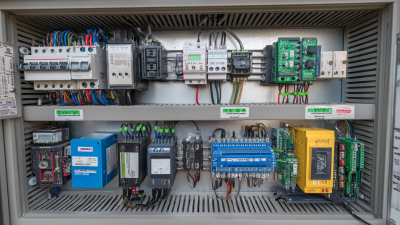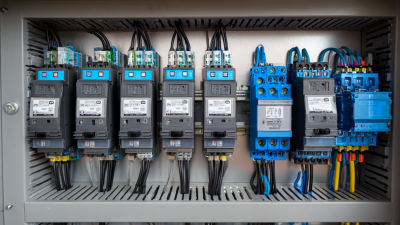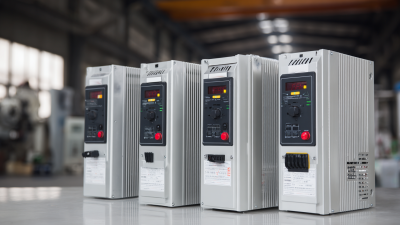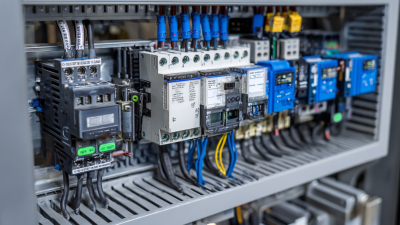Connect with us today to learn more about our industrial automation solutions—and how to commission them for your application.
5 Essential Reasons to Choose EMI Filters for Your Electronic Devices
In an era where electronic devices are becoming increasingly prevalent, ensuring their optimal performance and longevity has never been more critical. A recent industry report highlights that electromagnetic interference (EMI) is one of the leading causes of electronic device malfunction, impacting over 30% of products in the consumer electronics sector. To combat this pervasive issue, EMI filters have emerged as an essential component, safeguarding devices from disruptive noise and ensuring compliance with strict regulations. By integrating high-quality EMI filters, manufacturers can not only enhance the reliability and efficiency of their products but also meet increasingly stringent EMI standards set forth by regulatory bodies. This blog will explore five essential reasons to choose EMI filters for your electronic devices, emphasizing their crucial role in modern technology development and deployment.

The Importance of EMI Filters in Enhancing Device Performance
In today's technologically driven world, the performance of electronic devices is intricately linked to their ability to function without interference. Electromagnetic Interference (EMI) can disrupt the normal operation of electronic circuits, leading to malfunctions or degraded performance. This is where EMI filters come into play. By filtering out unwanted frequencies and suppressing electromagnetic noise, these filters ensure that devices operate smoothly and reliably.

Implementing EMI filters significantly enhances device performance by improving signal integrity and reducing errors. In sensitive applications such as medical equipment, telecommunications, and automotive systems, the stakes are particularly high. Without effective EMI filtering, even minor fluctuations could lead to data loss or system failures. Therefore, incorporating high-quality EMI filters is not just a precaution; it's a critical step toward ensuring the robustness and longevity of electronic devices amid the pervasive electromagnetic landscape.
Understanding Electromagnetic Interference: Impact on Modern Electronics
Electromagnetic interference (EMI) poses a significant challenge to the performance and reliability of modern electronic devices. This interference arises from a variety of sources, including power lines, radio frequency signals, and even natural phenomena. When these unwanted electromagnetic signals infiltrate electronic circuits, they can cause malfunctions, degradation of performance, and in extreme cases, total system failure. Understanding the impact of EMI on devices is crucial for manufacturers who wish to ensure consistent operation and user satisfaction.
Incorporating EMI filters into electronic devices is a proactive measure to mitigate these risks. These filters serve as barriers, selectively allowing signals to pass while blocking harmful interference. By doing so, they enhance the immunity of electronic systems to external disturbances, thereby improving the overall reliability and longevity of the devices. As technology continues to evolve, with more components packed into smaller spaces, the need for effective EMI management becomes increasingly vital for anyone involved in electronic design and manufacturing. Prioritizing EMI filters in the design phase not only protects the integrity of devices but also fosters user trust in the reliability of their electronic systems.
5 Essential Reasons to Choose EMI Filters for Your Electronic Devices
This chart illustrates the impact of electromagnetic interference (EMI) on different electronic devices. The data showcases the percentage of devices affected by EMI across various categories.
Key Statistics on EMI Impact: Costs and Device Failures in the Market
 Electromagnetic interference (EMI) poses significant challenges for electronic devices, leading to increased costs and device failures in the market. Recent statistics reveal that up to 40% of electronic device failures are attributed to EMI-related issues. This not only affects product performance but also places a financial burden on manufacturers and consumers alike. Understanding these impacts is essential for making informed decisions about electronic device design and protection.
Electromagnetic interference (EMI) poses significant challenges for electronic devices, leading to increased costs and device failures in the market. Recent statistics reveal that up to 40% of electronic device failures are attributed to EMI-related issues. This not only affects product performance but also places a financial burden on manufacturers and consumers alike. Understanding these impacts is essential for making informed decisions about electronic device design and protection.
One effective way to mitigate EMI effects is by incorporating EMI filters into your devices. These filters can significantly reduce noise and enhance performance, ultimately leading to greater reliability and lower warranty claims. When selecting filters, consider their compatibility with your specific application and ensure they meet relevant industry standards.
Tip: Regularly assess your devices’ susceptibility to EMI by conducting thorough tests during the development phase. Early identification of potential interference can save time and cost in the long run.
Moreover, investing in quality EMI filters can streamline your production and ensure compliance with regulations. Devices that effectively manage EMI tend to have longer lifespans, creating a positive reputation in the market.
Tip: Engage with EMI filter suppliers to explore customized solutions that suit your unique needs, as tailored approaches can yield better results than one-size-fits-all products.
How EMI Filters Improve Compliance with Industry Standards and Regulations
Electromagnetic Interference (EMI) filters play a crucial role in ensuring that electronic devices comply with industry standards and regulations. As technology continues to evolve, so do the requirements set by regulatory bodies regarding electromagnetic compatibility (EMC). Incorporating EMI filters into your devices not only helps in mitigating unwanted interference but also ensures compliance with standards such as IEC, FCC, and CISPR. These standards are designed to protect both the device and its environment, ensuring that electrical noise does not disrupt the operation of nearby electronic equipment.
Moreover, EMI filters enhance the reliability and performance of electronic devices. By blocking high-frequency noise and allowing only the desired signals to pass through, these filters help in maintaining signal integrity and reducing the risk of device malfunction. This is particularly important in industries such as telecommunications and aerospace, where adherence to stringent regulations is mandated. Investing in quality EMI filters can thereby prevent costly compliance failures and enhance the overall safety and functionality of electronic devices across various applications.
5 Essential Reasons to Choose EMI Filters for Your Electronic Devices
| Reason | Description | Impact on Compliance | Industry Standards |
|---|---|---|---|
| Noise Reduction | EMI filters significantly reduce electrical noise that can interfere with device operation. | Enhanced signal integrity, leading to better compliance with performance regulations. | IEC 61000-4-2 |
| Enhanced Reliability | By filtering out transient voltages, EMI filters contribute to the longevity of electronic devices. | Supports compliance with reliability standards, reducing warranty claims. | ISO 9001 |
| Regulatory Compliance | EMI filters facilitate adherence to international standards regarding electromagnetic emissions. | Important for passing compliance tests and certifications. | FCC Part 15 |
| Size and Design Flexibility | Modern EMI filters are compact, allowing for easy integration into various designs. | Meets design standards without compromising performance. | RoHS Directive |
| Cost Efficiency | Implementing EMI filters can reduce costs associated with troubleshooting and product recalls. | Improves overall profitability through compliance cost reductions. | CE Marking |
Selecting the Right EMI Filter: A Guide to Optimal Performance and Cost-Efficiency
When it comes to selecting the right Electromagnetic Interference (EMI) filter for your electronic devices, several key factors will guide your decision towards optimal performance and cost-efficiency. First and foremost, understanding the specific frequency range your devices operate within is crucial. This knowledge not only ensures that the filter you choose can effectively mitigate interference but also helps in avoiding unnecessary costs associated with over-specifying the filter’s capabilities.
Another important consideration is the filter’s insertion loss, which measures how much signal can pass through the filter while attenuating harmful noise. A balance between high insertion loss and minimal impact on signal integrity is vital for performance. It's also wise to consider the filter's size and mounting options, as these can affect the design and layout of your devices. Lastly, looking into the filter’s reliability and compliance with industry standards will ensure longevity and performance stability, ultimately translating to a more cost-efficient solution over time. By focusing on these aspects, you can make an informed choice that aligns with both performance needs and budget constraints.
Related Posts
-

7 Unique Benefits of Using Electromagnetic Brakes for Motor Applications
-

A Comprehensive Comparison of 220V VFD Single Phase Drives for Optimal Motor Performance
-

10 Best VFD Controllers You Need to Know for Optimal Performance
-

Discover High-Quality 220V VFD Single Phase Solutions from Leading Chinese Manufacturers
-

Discover How China is Revolutionizing Global Markets with Best 220v VFD Single Phase Solutions
-

Exploring Innovative Alternatives to Frequency Drive Controllers for Enhanced Performance